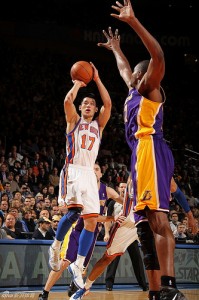Timing Matters for Armstrong, Clemens and Lin
One of the great lessons of contracts (and of the law more generally) is that the timing of actions can dramatically change legal consequences. An offeree who says “I accept” a moment after the offer is withdrawn is in a very different position than an offeree who says the same thing a moment before an attempt to withdrawn.
This past summer three sports stories seemed to turn on matters of timing. Les Carpenter writes that Lance Armstrong could have avoided is downfall if he had stayed retired:
The irony is that Armstrong could have remained a hero. He could have been a saint, as well as a beacon of light to millions who never would have thought he had cheated throughout his career. All he had to do was stay retired.
But hubris got the best of him. It’s the fatal flaw of driven men everywhere. He had to come back. He had to try France another time. And in doing so he reset the clock on the statute of limitations. He gave the federal government an opportunity to look through his life. If the government hadn’t looked at Armstrong over the last two years it’s hard to imagine USADA gathering the evidence to do what it is doing now.
In contrast, another famous athlete is considering coming out of retirement not despite, but because of a doping suspicion. Roger Clemens may be preparing to un-retire in order to reset a time period – the five-year Hall of Fame eligibility clock.
But the most interesting timing question involves Jeremy Lin. To my mind, the Knicks made at least two timing mistakes with regard to Lin’s resigning. First, the Knicks failed to make Lin an offer after free-agency period started on July 1:
The Knicks would not make a formal offer to Lin — not then, or, ultimately, ever — instead opting to steer him toward the open market so he could assess his own price.

(Photo: DvYang)
If the Knicks had moved first, they could have avoided having to match Houston’s poison-pill contract. The second, and more important, error concerns how the Knicks reacted the Houston’s initial offer. The Knick error was is in tipping their hand. Newspapers widely reported that Houston was poised to offer Lin “four years — with the fourth as a team option — and $28.8 million.” For some ungodly reason, the Knicks coach signaled that the Knicks were likely to match the Houston offer:
As news of the offer broke (and Lin’s camp says they did not communicate anything to the Knicks before an offer sheet was actually signed), Woodson publicly declared that Lin would “absolutely” be back. But not long after that, the Rockets came back with a revised offer: three years for $25.1 million, with the money rising from $5 million in the first season, to $5.225 million in the second, to $14.898 million in the third.
Woodson’s public July 11 comments that Lin would absolutely be back and that the “the Knicks ‘never once’ blinked at knowing they would have to pay [Houston’s initial offer]” were tragically short-sighted. It would have been better for the Knicks at that point to remain silent and immediately match the initial offer sheet as soon as it was signed.
By signaling that there were poised to match the initial offer, Woodson unwittingly may have caused Houston to up the ante — intensifying the poisonous of the final year offer. If Woodson had waited to speak, if the Knicks had matched more quickly, or if the Knicks had made an offer earlier, Lin might still be wearing Orange and Blue.
Editor’s Note: The USADA is not part of the federal government as the quoted Yahoo! article states.


Comments